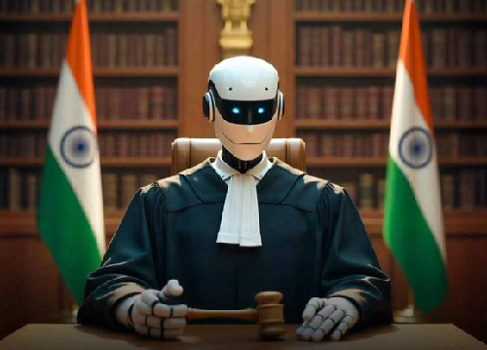In a move aimed at tackling the country’s massive backlog of over 50 million pending cases, India is considering a transformative, albeit controversial, step: the introduction of AI-powered systems to assist in judicial proceedings for minor crimes. While the concept of “robot judges” making autonomous verdicts is a distant and ethically complex prospect, India’s judiciary is actively exploring how AI can streamline processes and improve efficiency.
While there are no plans to replace human judges with robots, the government and the judiciary are moving forward with a vision where AI serves as a powerful aid. This initiative is part of the larger e-Courts Project, which has been allocated a substantial budget of over ₹72 billion (₹7210 crore) for its third phase. A significant portion of this funding, approximately ₹535.7 million (₹53.57 crore), is specifically earmarked for the integration of AI and blockchain technologies.
Here’s how AI is currently being integrated and what the future may hold:
- Automation of Routine Tasks: AI-driven tools are being deployed to automate administrative functions such as case management, scheduling, and document processing. This frees up judges and lawyers to focus on more complex matters. A notable example is the Supreme Court’s ‘SUPACE’ (Supreme Court Portal for Assistance in Court Efficiency) system, which assists judges with legal research and case summarization.
- Predictive Analytics: AI models are being used to analyze historical data to predict case durations and identify patterns, helping to prioritize cases and reduce backlogs.
- Language Translation: To bridge the language barrier in a linguistically diverse country, AI tools like ‘SUVAS’ (Supreme Court Vidhik Anuvaad Software) are being used to translate judicial documents and judgments from English to vernacular languages.
The idea of a machine rendering a verdict is a subject of intense debate. Legal experts and officials, including former Chief Justice of India B.R. Gavai, have voiced caution, emphasizing that justice is not just about speed but also about empathy, context, and moral reasoning, all of which remain beyond the grasp of current algorithms.
However, pilot projects in other countries show a possible future. Estonia, for instance, has tested AI to handle small claims, and China has pioneered “smart courts” for minor disputes. India is likely to follow a similar cautious approach, where AI may be used to provide recommendations or handle routine tasks like traffic violations or small-scale disputes, but the final judgment will always remain with a human.
To prepare for this AI-driven future, Indian law schools and legal tech startups are already launching specialized courses to train the next generation of legal professionals in AI and machine learning, ensuring that the human element remains at the heart of the justice system.







